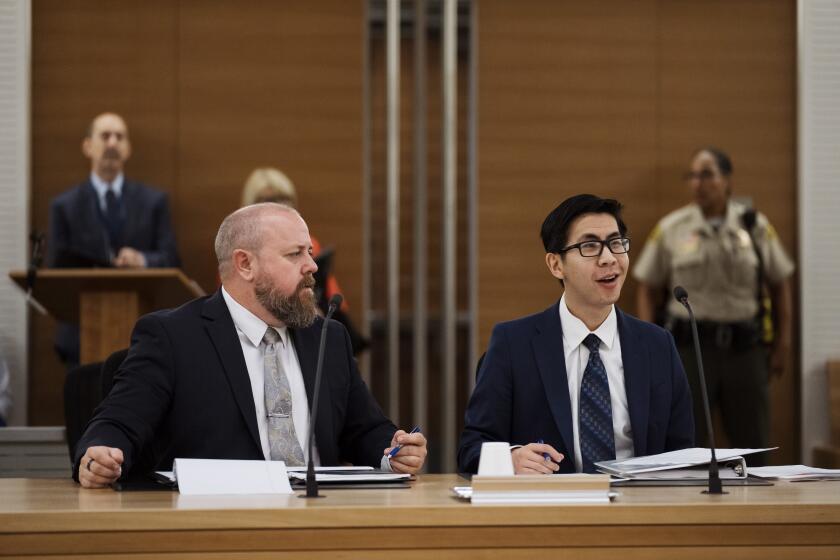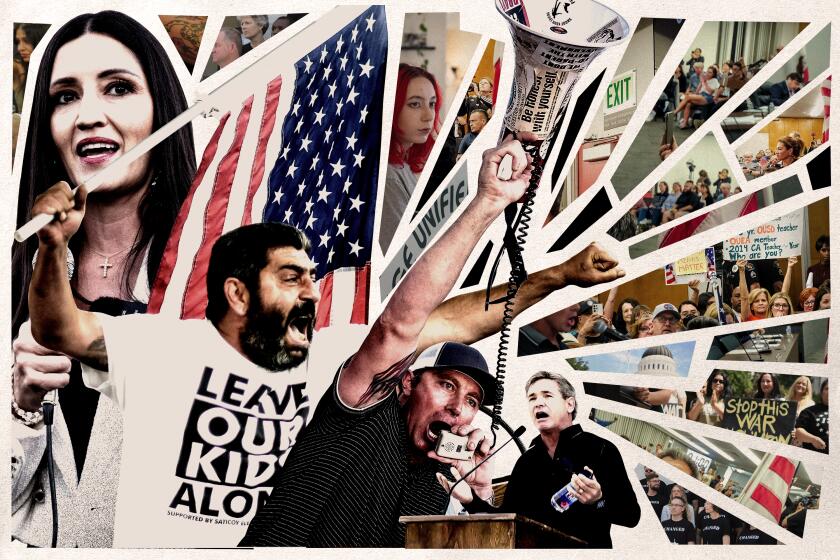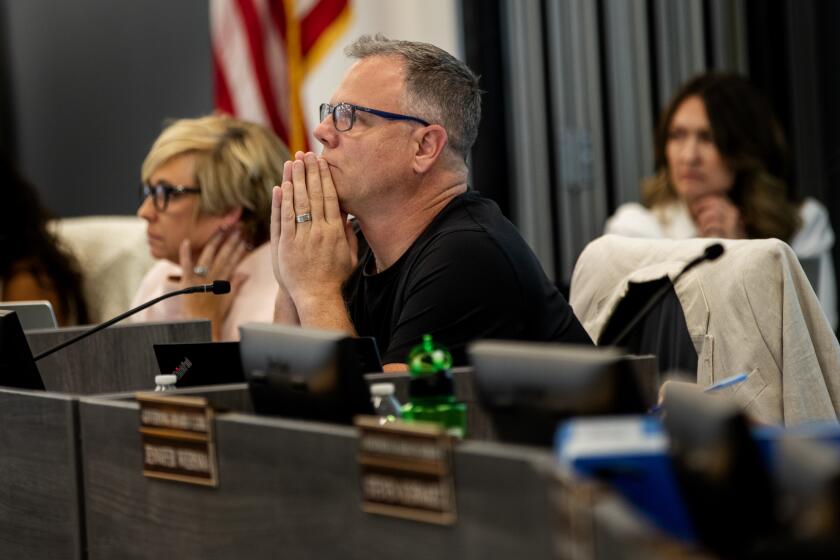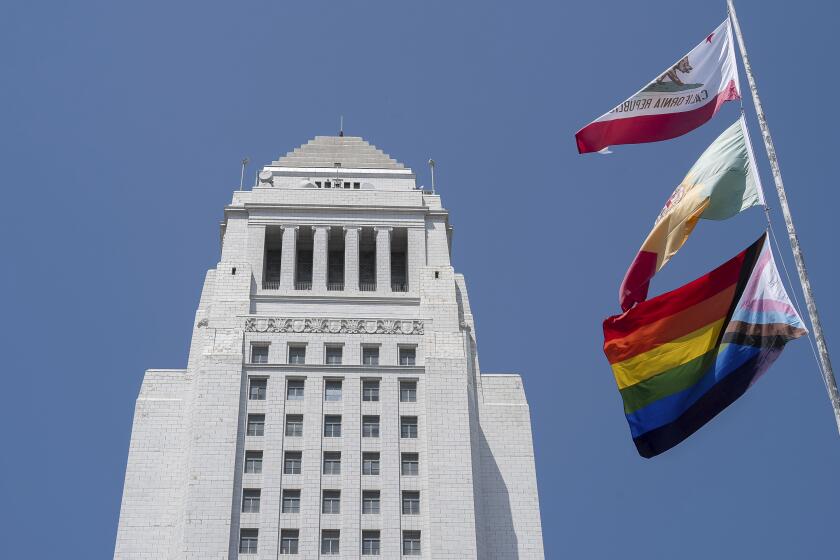Banned rainbows and ‘forced outing.’ Will elections reshape this relentless school board?
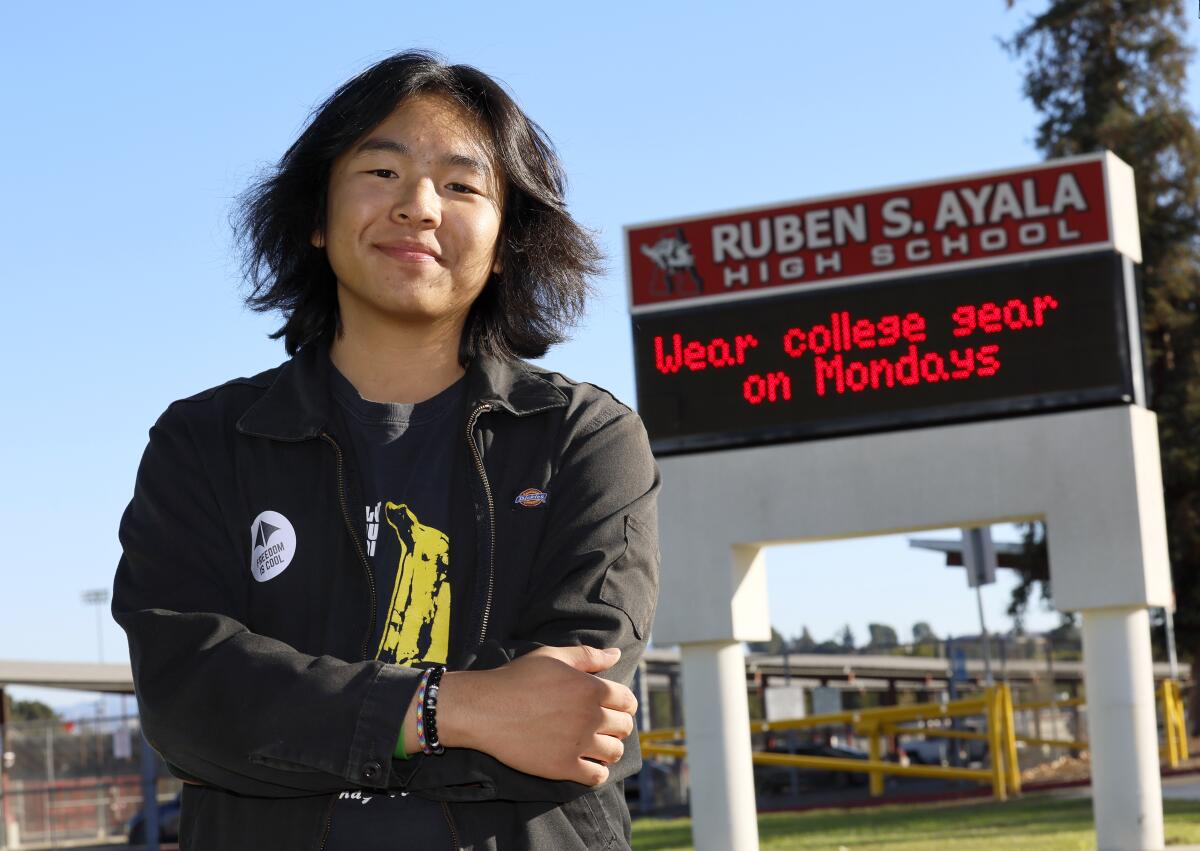
- Share via
At Senator Ruben S. Ayala Senior High School in Chino Hills, students this semester complained of broken air conditioners and bathroom sinks, faulty Chromebooks and Wi-Fi and, in one classroom, a ceiling leak that dripped into a bucket by a teacher’s desk as rats scurried across the floor.
But recently, school administrators dealt with a different in-classroom issue: the appearance of 4-by-6-inch rainbow-pattern note cards imprinted with the phrase “safe space.” Some teachers saw the cards as a way to show support to LGBTQ+ students. But school leaders said they went against a district ban on non-American flags, including rainbow ones, a symbol of LGBTQ+ pride. The cards are now gone.
The incident reflects the ongoing tensions inside the Chino Valley Unified School District 37 miles east of downtown Los Angeles, where a conservative board has for two years faced both praise and scorn as a relentless fighter in education culture wars, including “parental notification” issues, book bans and other polices that involve LGBTQ+ students.
In a politically mixed county that voted for President Biden by more than 10 points in 2020, the school board faces its own referendum on Tuesday when three of the five seats are open in election that could flip the conservative majority. During the months leading up to the election, the school board has robustly moved forward with its agenda and politics.
Last year California sued the district over the board’s approval of a parental notification rule requiring schools to alert parents if a student requested to be “identified or treated” as a gender other than their biological sex or the gender listed on their birth certificate. The district passed a revised policy that removed references to gender identity and applied to all students. A judge later issued a permanent injunction against all of the original policy except a portion that required schools to notify parents of unofficial or official changes to student records.
Over the summer, the state enacted a law that prohibits schools from mandating that teachers notify families about student gender identity changes.
A San Bernardino Superior Court judge issued a temporary restraining order Wednesday halting Chino Valley Unified’s controversial new policy requiring schools to notify parents if students identify as gender-nonconforming.
But in the latest salvo, the Chino board last month approved a “no deception” policy that requires all employees to “be truthful and honest and not misrepresent, either directly or by omission,” to parents. Opponents say the rule is another attempt to circumvent the new state law on parental notification and is overly expansive. Supporters say it is meant to force dishonest educators to be transparent with parents on all matters, although they are vague about what deceptions they believe to have taken place.
The new Chino regulation does not apply if disclosure is prohibited by law.
Last November, the board also approved a rule requiring school libraries to pull books if any district resident complains they are “sexually obscene.” The board then decides whether they should be permanently banned. Board members said they did not know how many books have been removed in total.
Karen England, a Tennessee-based activist who runs a national campaign to teach parents and boards how to challenge books, said during a get-out-the-vote event in Chino Hills this month that 25 books were taken out of Chino Valley libraries from 12 schools in early October, including “The Bluest Eye” by Toni Morrison. The board’s book rule borrowed language from one of England’s online guides.
Earlier, the board had banned rainbow pride flags in district classrooms, allowing for only government and military flags.
“It boggles my mind what goes on in this district,” said Donald Bridge, a former U.S. history and government teacher who is the lone dissenter on the Chino Valley board and finishing out his last term. “We want to teach students and give them a better education. But we seem to be focused on everything but that.”
Parental notification policies and laws — also called “forced outing” measures by LGBTQ+ advocates — have passed in eight states, and many more local school districts across the U.S., according to the Movement Advancement Project. But the debates have unfolded in every state.
“This is a national movement. ... A win in California looks really good for them because if you can win in liberal California, you can win anywhere,” said Maurice Cunningham, a retired professor from the University of Massachusetts at Boston who has studied conservative activism in education.
The costs of culture wars in schools
A new national study from the Institute for Democracy, Education and Access at UCLA found that of 467 public school superintendents in 46 states who were surveyed, close to 66%, said their districts have seen “moderate to high levels” of conflict on topics ranging from COVID-related measures to race and LGBTQ+ issues. The study estimated that public schools spent $3.2 billion in the 2023-24 school year on costs stemming from such conflicts. The tab included legal fees and increased security and communications workloads to respond to misinformation.
“The topics that school boards have focused on have shifted, going from a fairly narrow focus on teaching and learning about race and racism in 2021 to increasingly attacks related to LGBT+ student rights,” said John Rogers, a professor at UCLA’s Graduate School of Education and Information Studies, who co-authored the report.
Conservatives and right-wing agitators are waging a well-coordinated, anti-LGBTQ+ culture war in local school districts across California.
His research found that 50% of superintendents said they had been subject to harassment last school year over cultural conflicts, and roughly 10% had seen related threats of violence or property vandalism.
In the Chino Valley district, legal costs have soared — totaling more than $1.2 million last school year, more than double the annual total in 2022. The district says that the Chicago-based Liberty Justice Center, a conservative legal firm, is representing it for free in its legal battles with the state.
Sonja Shaw, the board president, blames the teachers union for increased administrative and legal spending. “They are wasting money and time of our staff,” she said, citing union complaints over new board policies and accusations that she has violated state law over open meetings.
A high-profile board president
In TV interviews, public events and from the school board dais, Shaw speaks against “woke indoctrination” of students. During a board meeting last year, she said non-binary and transgender students could use the help of “non-affirming” parents to “get better.” A parent to two public school teens, she was an outspoken critic of the board during pandemic school closures before winning her seat in Nov. 2022.
She says she is not anti-LGBTQ+ and faces opposition because she is “Christian and loves Jesus.”
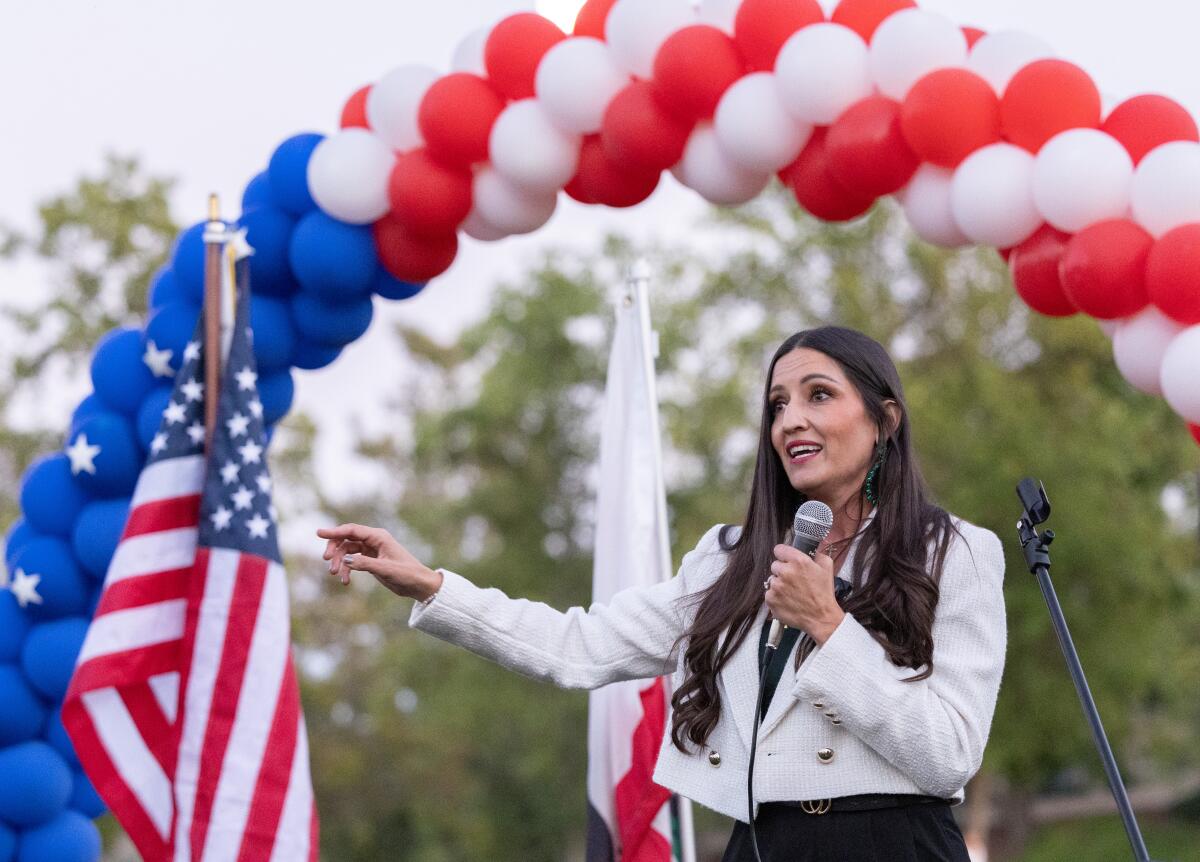
On the “safe space” rainbow cards, Shaw said: “I don’t get this mindset of us telling students that we are safe as a district or we are safe as teachers but your parents are not.”
Regarding the “no deception” rule, Shaw said it has “nothing to do with parental notification” about transgender teens. Instead, she called the policy a “statement of philosophy.”
“All we are saying here is let us make decisions for our community,” Shaw said. “What goes in L.A. may not go here. Let us have local control. If our community doesn’t like it, they will let us know.”
As board president of Chino Valley Unified, Sonja Shaw has catapulted from soccer mom to the face of California’s parental rights movement. She’d say it’s part of God’s plan.
The community’s response — by the way of votes — will be known next week. In the three board seats up for election, it’s become a contest of liberals vs. conservatives. Candidates in each race are speaking against the district’s current direction. Incumbents in two races are promoting board positions. The Associated Chino Teachers union has endorsed candidates opposed to parental notification and other LGBTQ+-related policies.
Such issues have also become contentious on schools boards in Temecula, Redlands, Murietta and Riverside, which are also facing elections. The California Teachers Assn., in which the Chino union is a chapter, has become increasingly involved supporting more liberal-leaning candidates, including at a teachers rally held last week outside a Temecula shopping center.
In Chino Valley, Shaw’s seat isn’t up for two years. Two years ago, when voters elected Shaw and another conservative board member, Jon Monroe, Shaw won by 317 votes and Monroe by 1,055. A little more than 10,000 ballots were cast in each race.
The area, while more conservative than Los Angeles County, is not a GOP stronghold. In 2020, Joe Biden won the precinct where the district building is located by 19 points. But in several nearby precincts, Donald Trump won by close to 10 points.
Temecula school board President Joseph Komrosky, a religious conservative, lost a recall vote, officials announced Thursday.
In the Chino Valley district, 26,000 students are spread over 34 schools. About 55% are Hispanic, while roughly 26% are Asian American, 11% white and 3.7% Black.
Campus tensions
Students interviewed from multiple high schools in Chino Valley say they are growing increasingly concerned.
At a board meeting this month over the “no deception” policy, dozens showed up with parents and hand-held rainbow flags to register their protest.
Jeremiah, a senior at Ayala High School, was one of them. During the public comment period, he urged the board “to stop peddling lies that weaponize parents’ care for their children against teachers.”
In an interview, Jeremiah, who is gay and did not use his last name because he feared retribution for speaking out, said he felt a shift the past two years toward less tolerance for LGBTQ+ students.

“I grew up in a family that is loving of me,” he said. “But that is not the case for other students and their families.”
Some Chino Valley students went further, saying the school board stances have created an increasingly hostile environment for LGBTQ+ teens and supportive teachers.
They spoke of a September incident at Ayala, where anti-gay insults were hurled at the leader of the campus LGBTQ+ group during a school-wide club recruitment event. A student flipped over a table, causing the LGBTQ+ club leader to hit his head on a planter. Police were notified of the alleged bullying attack. Shaw has expressed concern over the incident.
“I reject that our district’s policies have created an unsafe environment for students,” Shaw said. “Bullying of any kind is unacceptable.”
Last month, the district put the teacher who advises the club under leave for “unprofessional conduct.” The allegations are unclear. Shaw confirmed the leave but would not elaborate. The teacher and her union also declined. Pro-LGBTQ+ parent activists are accusing the district of retaliation against an outspoken board critic.
During the October board meeting, another district student told the board she felt her “rights were being stripped away.” She said her high school had other issues that were more important, like broken air conditioners and bad Wi-Fi. The student, who said her name was Akeel, did not say which school she attended.
The new law shields teachers from retaliation for supporting transgender students and prohibits school policies that require “forced disclosure” of youth gender decisions to their families.
Teachers also spoke out.
Amanda Swager, a chemistry teacher at Chino High School who said they were intersex, said “these sideshows, these resolutions do absolutely nothing.”
Students and teachers who attended the board meeting last month were overwhelmingly against the board and its policies. But parents, including a contingent from the Calvary Chapel Chino Hills megachurch that has backed conservative board members, came out to support the “no-deception” policy.
Misty Startup, a parent of a Chino Hills High School sophomore, said she was pleased board leaders worked against “lies by unions and their candidates.” Startup, a nurse, said in an interview that the district was wrongly painted as anti-LGBTQ+.
“If a child is worried about their sexual orientation, gender or having suicidal thoughts, the response should always be ‘let’s talk with your parents,’” Startup said in an interview. “Not, ‘oh, don’t tell your parents, they might not be supportive.’”
“The story here is parents who love their kids and want the best for them,” she said. “People twist it into homophobia and racism.”
Kristi Hirst, who co-founded the liberal-leaning education advocacy group Our Schools USA, was also present.
“They’re obsessed with being able to out kids,” Hirst, a parent of three children in the system and a former district teacher, said of the board in an interview. “This is literally their entire focus of the last two years. We can only hope that, come the election, things change.”
More to Read
Sign up for Essential California
The most important California stories and recommendations in your inbox every morning.
You may occasionally receive promotional content from the Los Angeles Times.

